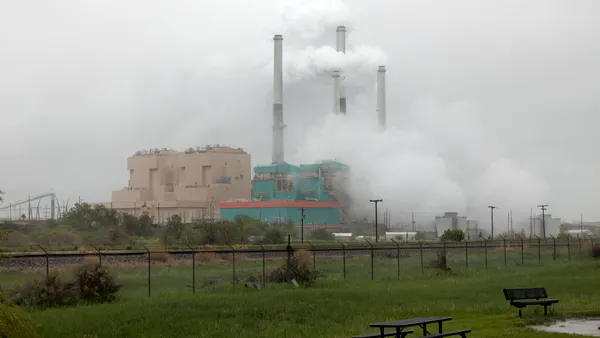Dive Brief:
- ISO New England must work more quickly to find a market-based solution to winter reliability, federal regulators determined last week.
- A two-settlement capacity market design may help address winter reliability concerns in the future, but the plan will not be fully implemented until the 2018-2019 season, RTO Insider reports.
- In the meantime, FERC directed the ISO to develop a market-based solution rather than continuing to rely on fuel-switching incentives during cold weather.
Dive Insight:
Still dealing with vulnerabilities exposed during last winter's Polar Vortex, ISO New England has relied on incentives rather than market signals to ensure sufficient generation is available in the event cold weather stymies natural gas deliveries. But generators, worried the grid operator is not working fast enough on a market solution, lobbied FERC to clarify the situation's urgency.
Over the summer, the ISO submitted what FERC describes as a "temporary, out-of-market solution," with a goal to ensure adequate fuel supplies by creating incentives for dual-fuel resource capability and participation, offsetting the carrying costs of unused firm fuel purchased by generators, and providing compensation for demand response services.
The ISO said it was hopeful some market changes would address the region's reliance on gas for this winter, but ultimately concluded a 2014-2015 reliability program was necessary due to retirements of non-natural gas generation capable of producing a significant amount of energy during the winter. The operator also said it was worried that pipeline constraints during the 2013-2014 winter were worse than expected, and that generators had difficulty replenishing oil inventories mid-season during.
But the New England Power Generators Association subsequently filed for clarification, saying FERC had directed the operator to develop a market-based solution for this winter. FERC agreed, clarifying that "the commission intended that ISO-NE would determine whether a winter reliability solution is necessary for the 2015-2016 winter and future winters, and, if so, develop an appropriate market-based solution through the stakeholder process that can be implemented beginning with the 2015-2016 winter."
Of the decision, ISO representative Marcia Blomberg told RTO Insider, "We’ll continue with the stakeholder process, which we began a couple of months ago. We’re still assessing the impact of this order, in light of the work that’s been done so far."












